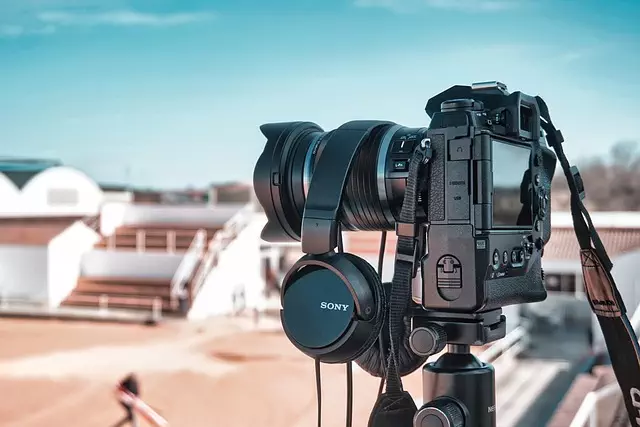TL;DR:
Converting DivX videos is crucial for modern compatibility due to its non-standard format limiting playback on many devices and platforms. Key steps involve using specialized software to convert DivX to universal formats like MP4 or MKV, maintaining quality, and ensuring seamless playback across diverse hardware. Popular tools include HandBrake, FFmpeg, Online-Convert.com, VLC, and dedicated DivX converters. Customization options allow users to set resolution, bitrate, and encoding profiles according to their needs. This process democratizes access to high-quality video content on any device.
Introduction:
DivX, a powerful video codec, has long been a favorite for compressing videos while retaining excellent quality. However, its compatibility issues across various devices have posed challenges for users. This comprehensive guide tackles these problems by teaching you how to convert DivX videos seamlessly. We’ll walk you through the process, from understanding DivX’s fundamentals and compatibility concerns to preparing the right tools, optimizing video quality for different devices, and troubleshooting common conversion problems.
Understanding DivX and Its Compatibility Issues

DivX, once a popular video codec, has fallen out of favor due to compatibility issues and lack of support for newer technologies. The format was known for its ability to compress videos to smaller file sizes while maintaining high-quality playback, but it faced challenges when trying to play them on modern devices and platforms. This is primarily because DivX did not adhere to industry standards, making it incompatible with many media players and streaming services.
Converting DivX files to more universal formats like MP4 or MKV can significantly improve compatibility. By doing so, users can ensure that their videos will play seamlessly on various devices, including smartphones, tablets, and modern media players. How to Convert DivX involves using specialized video conversion software that supports a wide range of codecs, allowing for smooth transition to more widely accepted formats while preserving the original quality.
– Brief explanation of DivX as a video codec

DivX is a powerful video codec that allows for efficient compression and high-quality playback of videos, making it an ideal choice for streaming media and archival purposes. It employs advanced compression techniques to reduce file sizes while maintaining excellent visual fidelity. This makes DivX a popular format for sharing videos online or storing large multimedia libraries on devices with limited storage space.
Converting videos to DivX format offers numerous advantages. It ensures compatibility across various platforms and devices, enabling smooth playback without the need for additional codecs. Furthermore, how to convert DivX files is straightforward; many video editing software packages support this codec, allowing users to easily encode their media in a widely recognized format.
– Discussion on device-specific compatibility challenges

Converting videos to a compatible format, like DivX, is essential for ensuring high-quality playback across diverse devices. One of the primary challenges in this process lies in navigating device-specific compatibility issues. Each device, whether it’s a smartphone, tablet, or smart TV, has its own set of video decoding capabilities and constraints. This means that a video format suitable for one device might not be supported by another, leading to potential playback problems or reduced quality.
To overcome these challenges, video converters need to account for various factors such as hardware acceleration, codec support, and maximum resolution limitations. How to Convert DivX effectively involves selecting the appropriate encoding settings, choosing the right codecs that are universally compatible (like H.264 or HEVC), and ensuring the output video is optimized for the intended devices without compromising quality.
Preparation: Tools and Software Required

To get started with high-quality video playback, one of the first steps is preparation. For those interested in converting DivX files to a more versatile format, specific tools and software are necessary. Fortunately, there are several reliable options available that make this process straightforward.
The most common and efficient method involves using dedicated video conversion software. Tools like HandBrake, FFmpeg, or online converters (e.g., Online-Convert.com) offer user-friendly interfaces and support for a wide range of formats, including DivX. These tools allow you to adjust settings such as resolution, bitrate, and encoding profiles to ensure the output meets your quality standards. Additionally, having basic knowledge of command-line interfaces can be beneficial when using FFmpeg, providing advanced users with greater control over the conversion process.
– Listing essential conversion tools and software

Converting video files, especially those with less common formats like DivX, is a crucial step in ensuring compatibility and optimal viewing experience across various devices. The process involves using specific tools and software that can handle the unique aspects of these file types, ensuring high-quality playback regardless of the destination device.
For How to Convert DivX files, several reliable conversion tools are available. HandBrake is a popular open-source converter known for its flexibility and ability to preserve video quality. VLC Media Player also offers built-in conversion capabilities, making it convenient for quick file transformations. Additionally, specialized software like DivX Converter or online platforms that support DivX conversion can provide efficient solutions for users looking for user-friendly interfaces. These tools simplify the process, allowing you to easily change video formats while maintaining excellent picture and sound quality.
Converting DivX files is crucial for ensuring high-quality video playback on any device. By understanding the codec’s capabilities and potential compatibility issues, you can seamlessly prepare your videos using the right tools. With the software mentioned in this guide, you’ll be well-equipped to handle DivX conversion tasks, enabling smooth playback across various platforms. So, whether it’s for personal entertainment or sharing online, how to convert DivX is now simpler than ever.
